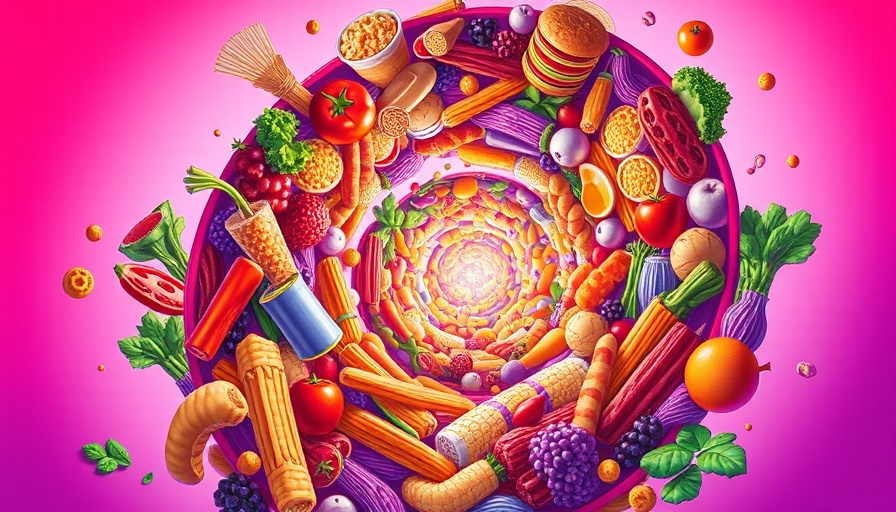
Are Ultraprocessed Foods Addictive? Understanding the Science Behind Our Cravings
In recent years, we have witnessed a growing concern regarding ultraprocessed foods and their impact on our health. With the rise of obesity and related disorders, many researchers are now asking an important question: Are ultraprocessed foods addictive? This question has gained traction, prompting scientists to dig deeper into the complex relationship between our eating habits and addiction-like behaviors.
The Allure of Ultraprocessed Foods
Ultraprocessed foods, characterized by their high content of refined sugars and unhealthy fats, have become staples in many households. A recent report highlighted that the consumption of these foods correlates strongly with overeating, which in turn is linked to weight gain and obesity. Dr. Robert Califf, former commissioner of the FDA, posited that these foods might act on brain pathways associated with addiction similar to those activated by substances like opioids.
The Science of Food Addiction: A Closer Look
Previous research conducted on food addiction has primarily utilized the Yale Food Addiction Scale (YFAS), which evaluates whether individuals exhibit symptoms akin to substance use disorders. Findings reveal a troubling picture: around 14% of adults and 15% of youths may experience addiction-like symptoms related to ultraprocessed foods.
Interestingly, ultraprocessed foods deliver energy rapidly and often lead to a quick dopamine release in the brain, mimicking the effects of addictive substances. This rapid response can create a cycle of cravings, urging individuals to seek out these satisfying but unhealthy options repeatedly.
Why Are Ultraprocessed Foods So Compelling?
To understand the addictive nature of ultraprocessed foods, we can look at their chemical makeup. Many of these products are enhanced with additives designed to amplify flavors and manipulate mouthfeel, making them incredibly palatable. The speed at which they can be consumed also contributes to their addictiveness. Unlike minimally processed foods, which often require thorough chewing and digestion, ultraprocessed options are engineered for instant gratification.
Furthermore, there is emerging evidence indicating that people from disadvantaged communities, who are likely to rely on cheaper and more accessible ultraprocessed foods, might experience higher rates of food addiction. This poses significant public health concerns, especially in light of existing eating disorders and obesity.
The Role of Marketing and Accessibility in Food Addiction
Marketing strategies for ultraprocessed foods often target vulnerable populations, making them more appealing. Their availability and affordability in low-income neighborhoods worsen the risk of addiction among those already facing food insecurity. Given these conditions, it is essential that policy changes consider the environmental and societal factors contributing to the prevalence of ultraprocessed food addiction.
Clinical Implications and Treatment Options
Recognizing ultraprocessed food addiction as a legitimate issue may pave the way for specialized treatment approaches. Existing pathways for treating substance misuse, such as pharmaceutical interventions and cognitive behavioral therapies, might also hold promise in addressing food addiction. Moreover, clinical guidelines need to be developed to effectively assist those affected by ultraprocessed food addiction.
Public Health Perspectives: What Can Be Done?
To combat the rising tide of ultraprocessed food addiction, researchers advocate for increased accessibility to healthier foods, along with improved public health messaging that can effectively address the underlying causes of these eating patterns. Policies that encourage the reformulation of ultraprocessed foods to reduce sugar and fat content could also be instrumental in fighting this issue.
What Does the Future Hold?
As studies continue to emerge, gaining a better grasp of the addictive nature of ultraprocessed foods will prove crucial. Understanding the brain chemistry behind our cravings will aid in developing strategies to counteract them. The classification of ultraprocessed foods as addictive substances could lead to necessary regulatory actions, similar to those aimed at the tobacco industry, thereby protecting public health.
Ultimately, reducing reliance on ultraprocessed foods may require a multifaceted approach, incorporating education, policy reforms, and community support systems to protect individuals from succumbing to food addiction. The fight against ultraprocessed food addiction is not only a personal challenge but a broader societal responsibility that involves changing attitudes, practices, and policies.
As we continue our exploration into the complexities of our food systems, awareness and informed choices are key. It's important for consumers to understand how ultraprocessed foods influence their health and make deliberate decisions about their diets.
 Add Row
Add Row  Add
Add 




 Add Row
Add Row  Add
Add 

Write A Comment